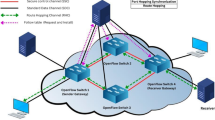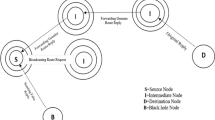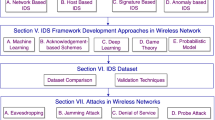Abstract
The Optimized Link State Routing Protocol (OLSR) operates as proactive routing protocol destined for Mobile Ad hoc Network, OLSR is considering as one of the four important routing protocols identified by the Internet Engineering Task Force. The core of performance in OLSR routing protocol is the Multipoint Relays (MPRs) which are selected nodes responsible to forward broadcast messages during the flooding process in order to optimize the message overhead across the network. However, OLSR can be affected by the single Black hole attack that presents an active routing attack disturbs the network by dropping the forwarding packets. In this paper, we propose a new algorithm of selection for the MPR set in order to avoid malicious neighbors and select the thrust one by add a new criterion named as degree of forwarding. Our approach is based on exchanging acknowledgment Hello message between 2-hop neighbors when message HELLO is forwarded successfully between them, some modifications in MPR selection process are also made to select the most secure MPR nodes. The simulation of our proposed solution gives highly motivated results compared to the standard version of OLSR routing protocol under the Black hole attack in different network metrics as the throughput, packet delivery ratio, End-to-End delay, jitter delay and packet lost.










Similar content being viewed by others
References
Pushpalatha, K., & Karthikeyan, M. (2019). A generalized framework for disruption tolerant secure opportunistic routing during emergency situations using MANETs. Cluster Computing, 22, 9905–9913. https://doi.org/10.1007/s10586-018-1849-0.
Islabudeen, M., & Kavitha Devi, M. K. (2020). A smart approach for intrusion detection and prevention system in mobile ad hoc networks against security attacks. Wireless Personal Communications, 112, 193–224. https://doi.org/10.1007/s11277-019-07022-5.
Kushwah, R., Tapaswi, S., & Kumar, A. (2020). Multipath delay analysis using queuing theory for gateway selection in hybrid MANET. Wireless Personal Communications, 111, 9–32. https://doi.org/10.1007/s11277-019-06842-9.
Clausen, T., & Jacquet, P. (2003). Optimized link state routing protocol (OLSR). Retrieved August 17, 2020 from, https://tools.ietf.org/html/draft-ietf-manet-olsr-11.
Abhilash, K. J., & Shivaprakasha, K. S. (2020). Secure routing protocol for MANET: A survey. In S. Kalya, M. Kulkarni, & K. S. Shivaprakasha (Eds.), Advances in communication, signal processing, VLSI, and embedded systems (pp. 263–277). Singapore: Springer. https://doi.org/10.1007/978-981-15-0626-0_22.
Mwangi, E. G., Muketha, G. M., & Ndungu, G. K. (2019). A review of security techniques against black hole attacks in mobile ad hoc networks. In 2019 IST-Africa week conference (IST-Africa) (pp. 1–8). https://doi.org/10.23919/ISTAFRICA.2019.8764862.
ns-3 | a discrete-event network simulator for internet systems. Retrieved August 17, 2018 from, https://www.nsnam.org/.
Jacquet, P., Muhlethaler, P., Clausen, T., Laouiti, A., Qayyum, A., & Viennot, L. (2001). Optimized link state routing protocol for adhoc networks.
Raffo, D., Adjih, C., Clausen, T., & Mühlethaler, P. (2004). An advanced signature system for OLSR. In SASN’04 ACM 1-58113-972-1040010, Washington, DC, USA.
Tseng, F.-H., Chou, L.-D., Chao, H.-C. (2011). A survey of black hole attacks in wireless mobile ad hoc networks. http://www.hcis-journal.com/content/1/1/4.
Dokurer, S., Erten, Y. M., & Acar, C. E. (2007). Performance analysis of ad-hoc networks under black hole attacks. In Proceedings 2007 IEEE SoutheastCon (pp. 148–153). https://doi.org/10.1109/SECON.2007.342872.
Thakur, A., & Gupta, A. (2014). Black hole problem with OLSR protocol in MANETs. International Journal of Latest Trends in Engineering and Technology (IJLTET)., 4(3), 1–4.
Joy, A., & Cherian, S. (2013). Black hole attack and its mitigation techniques in AODV And OLSR. International Journal of Computer Science & Engineering Technology, 4(6), 740–745.
Djahel, S., Nait-Abdesselam, F., & Khokhar, A. (2008). An acknowledgment-based scheme to defend against cooperative black hole attacks in optimized link state routing protocol. In 2008 IEEE international conference on communications (pp. 2780–2785). https://doi.org/10.1109/ICC.2008.524.
Wang, M., Lamont, L., Mason, P., & Gorlatova, M. (2005). An effective intrusion detection approach for OLSR MANET protocol. In 1st IEEE ICNP workshop on secure network protocols (NPSec) (pp. 55–60). https://doi.org/10.1109/NPSEC.2005.1532054.
Djahel, S., & Nait-Abdesselam, F. (2008). Avoiding virtual link attacks in wireless ad hoc networks. In 2008 IEEE/ACS international conference on computer systems and applications (pp. 355–360). https://doi.org/10.1109/AICCSA.2008.4493557.
Bhuvaneswari, R., & Ramachandran, R. (2018). Denial of service attack solution in OLSR basedmanet by varying number of fictitious nodes. Cluster Computing, 22, 12689–12699. https://doi.org/10.1007/s10586-018-1723-0.
Jeon, Y., Kim, T.-H., Kim, Y., & Kim, J. (2012). LT-OLSR: attack-tolerant OLSR against link spoofing.
Cuppens, F., Cuppens-Boulahia, N., Ramard, T., & Thomas, J. (2007). Misbehaviors detection to ensure availability in OLSR. In H. Zhang, S. Olariu, J. Cao, & D. B. Johnson (Eds.), Mobile ad-hoc and sensor networks. MSN 2007. Lecture notes in computer science (Vol. 4864, pp. 799–813). Berlin: Springer.
Zougagh, H., Toumanari, A., Latif, R., Elmourabit, Y., & Idboufker, N. (2014). Modified OLSR protocol for detection and prevention of packet dropping attack in MANET. International Journal of Computer Applications, 100, 32–38.
Ayad, K., & Bouabana-Tebibel, T. (2012). New efficient mechanisms to secure OLSR protocol.
Hong, F., Hong, L., & Fu, C. (2005). Secure OLSR.
Adjih, C., Clausen, T., Jacquet, P., Laouiti, A., Muhlethaler, P., & Raffo, D. (2005). Securing the OLSR protocol.
Malik, D., Mahajan, K., & Rizvi, M. A. (2014). Security for node isolation attack on OLSR by modifying MPR selection process. In 2014 first international conference on networks soft computing (ICNSC2014) (pp. 102–106). https://doi.org/10.1109/CNSC.2014.6906680
Saddiki, K., Boukli-Hacene, S., Lorenz, P., & Gilg, M. (2017). Black hole attack detection and ignoring in OLSR protocol. International Journal of Trust Management in Computing and Communications, 4, 75–93.
Gerhards-Padilla, E., Aschenbruck, N., Martini, P., Jahnke, M., & Tolle, J. (2007). Detecting black hole attacks in tactical MANETs using topology graphs.
Hyytiä, E., & Virtamo, J. (2007). Random waypoint mobility model in cellular networks. Wireless Networks, 13, 177–188. https://doi.org/10.1007/s11276-006-4600-3.
Nabou, A., Laanaoui, M. D., & Ouzzif, M. (2019). The effect of transmit power on MANET routing protocols using AODV, DSDV, DSR and OLSR in NS3. In M. Ezziyyani (Ed.), Advanced intelligent systems for sustainable development (AI2SD’2018) (pp. 274–286). Cham: Springer. https://doi.org/10.1007/978-3-030-11928-7_24.
Camp, T., Boleng, J., & Davies, V. (2002). A survey of mobility models for ad hoc network research. Wireless Communications and Mobile Computing, 2, 483–502. https://doi.org/10.1002/wcm.72.
Author information
Authors and Affiliations
Corresponding author
Additional information
Publisher's Note
Springer Nature remains neutral with regard to jurisdictional claims in published maps and institutional affiliations.
Rights and permissions
About this article
Cite this article
Nabou, A., Laanaoui, M.D. & Ouzzif, M. New MPR Computation for Securing OLSR Routing Protocol Against Single Black Hole Attack. Wireless Pers Commun 117, 525–544 (2021). https://doi.org/10.1007/s11277-020-07881-3
Accepted:
Published:
Issue Date:
DOI: https://doi.org/10.1007/s11277-020-07881-3




